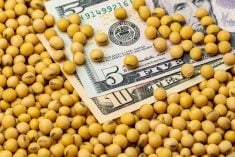Buenos Aires | Reuters –– Argentina will use “all the tools” at its disposal to end financial speculation by grains producers and exporters, government cabinet chief Jorge Capitanich said Wednesday, in a further sign of state intervention in Latin America’s No. 3 economy.
Soy producers in Argentina, the world’s No. 3 soybean exporter, have been holding onto the oilseed in view of low global prices and financial uncertainty at home, depriving the cash-strapped government of critical tax revenue from export charges.
Argentina has long warned producers that they must sell more of their product without acting on its words. The country last month passed a controversial law enabling the government to intervene more in companies’ pricing and supply.
Read Also

U.S. grains: Soy futures post biggest monthly gain in nearly five years on China trade optimism
U.S. soybean futures climbed to a 15-month high and posted their biggest monthly gain in nearly five years on Friday following a rally fueled by the prospect of revived exports to China.
“We believe it is necessary to use all the state’s tools to guarantee that all speculative maneuvers are ended,” Capitanich said in his daily news briefing, although he did not specify what the government would do.
The government has already met with exporters but has not been able to reach a consensus on sales volumes, he said.
“We are working with companies on a bilateral agenda from today in order to verify the targets for liquidation of exports because we believe clearly that it is markedly insufficient.”
Soybean futures on the Chicago Board of Trade fell last month to the lowest level in four-and-a-half years, pressured by the harvest of a record U.S. crop.
In addition to low prices, expectations of another sharp devaluation in the peso after a 20 per cent devaluation in January are encouraging producers to hold onto stock.
The currency is under pressure as the country grapples with one of the world’s highest inflation rates, a stagnant economy and the government’s failure to complete a sovereign bond payment in July.
But Capitanich said the decision of the grains sector not to sell was “damaging for the country and for them too,” given that prices were clearly on a downward trend. The government estimated producers had accumulated 25 million tonnes of stock.
Barred from global credit markets since its catastrophic 2002 default, Argentina is reliant on its trade surplus to obtain dollars. Foreign reserves have fallen to eight-year lows and the country faces financial stress in 2015, when debt servicing costs are set to double.
Capitanich said soy producers holding onto stock were also hurting other sectors, such as grains transport workers.
The Argentine government has ramped up state intervention in the economy to try to prevent its new default in July from triggering a balance of payments crisis, but its policies are also battering business confidence.
— Reporting for Reuters by Sarah Marsh and Eliana Raszewski in Buenos Aires.











